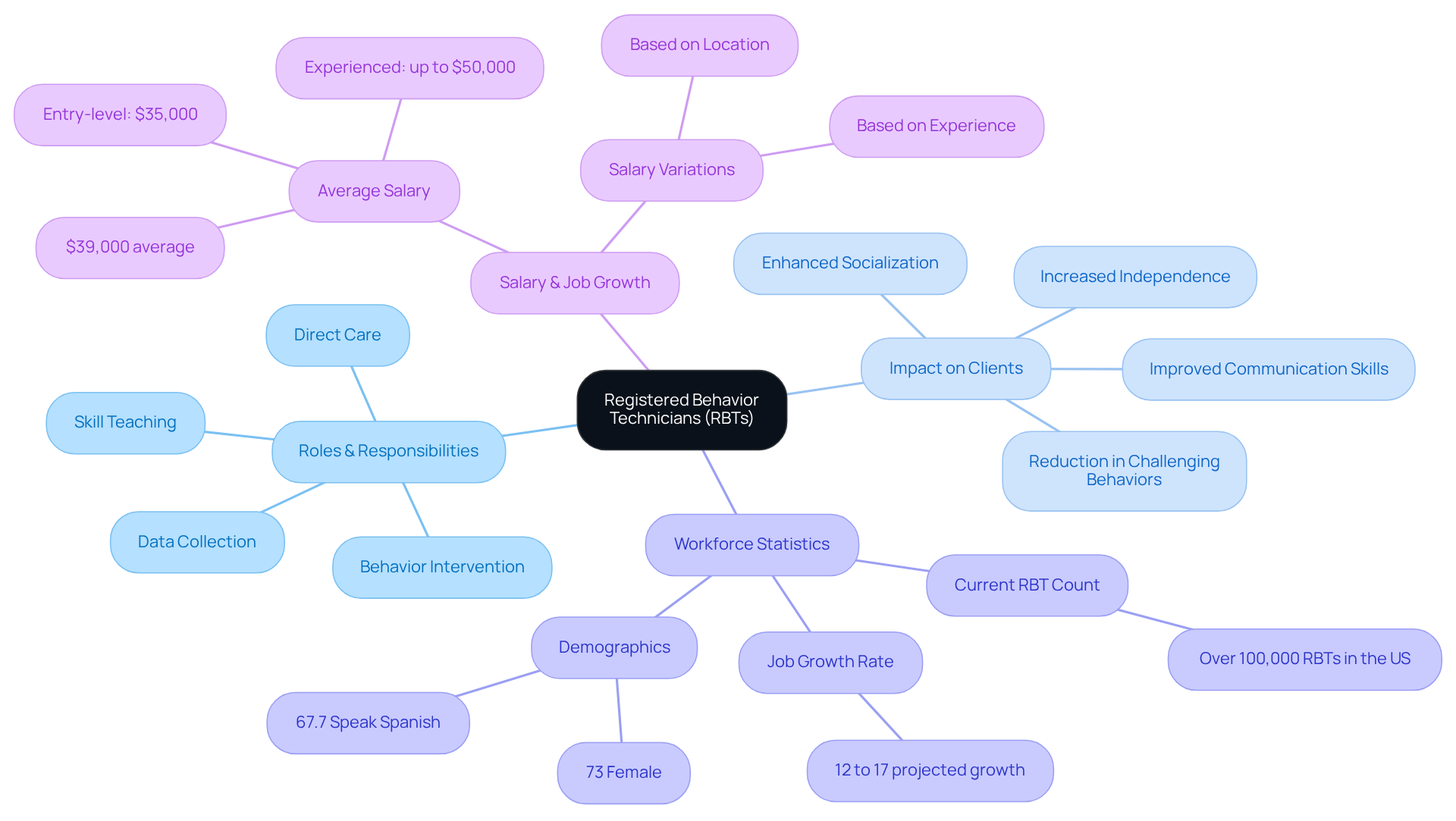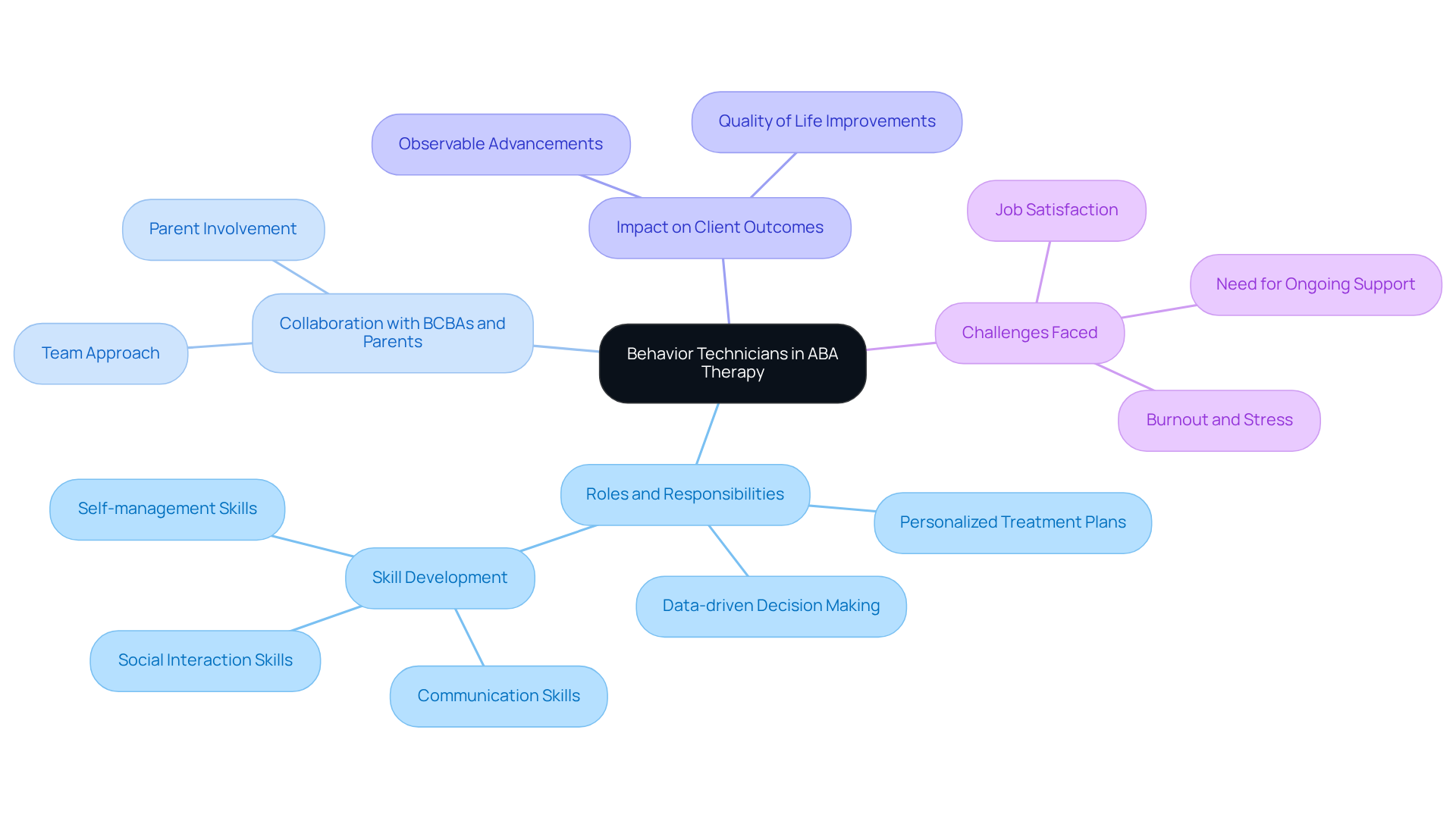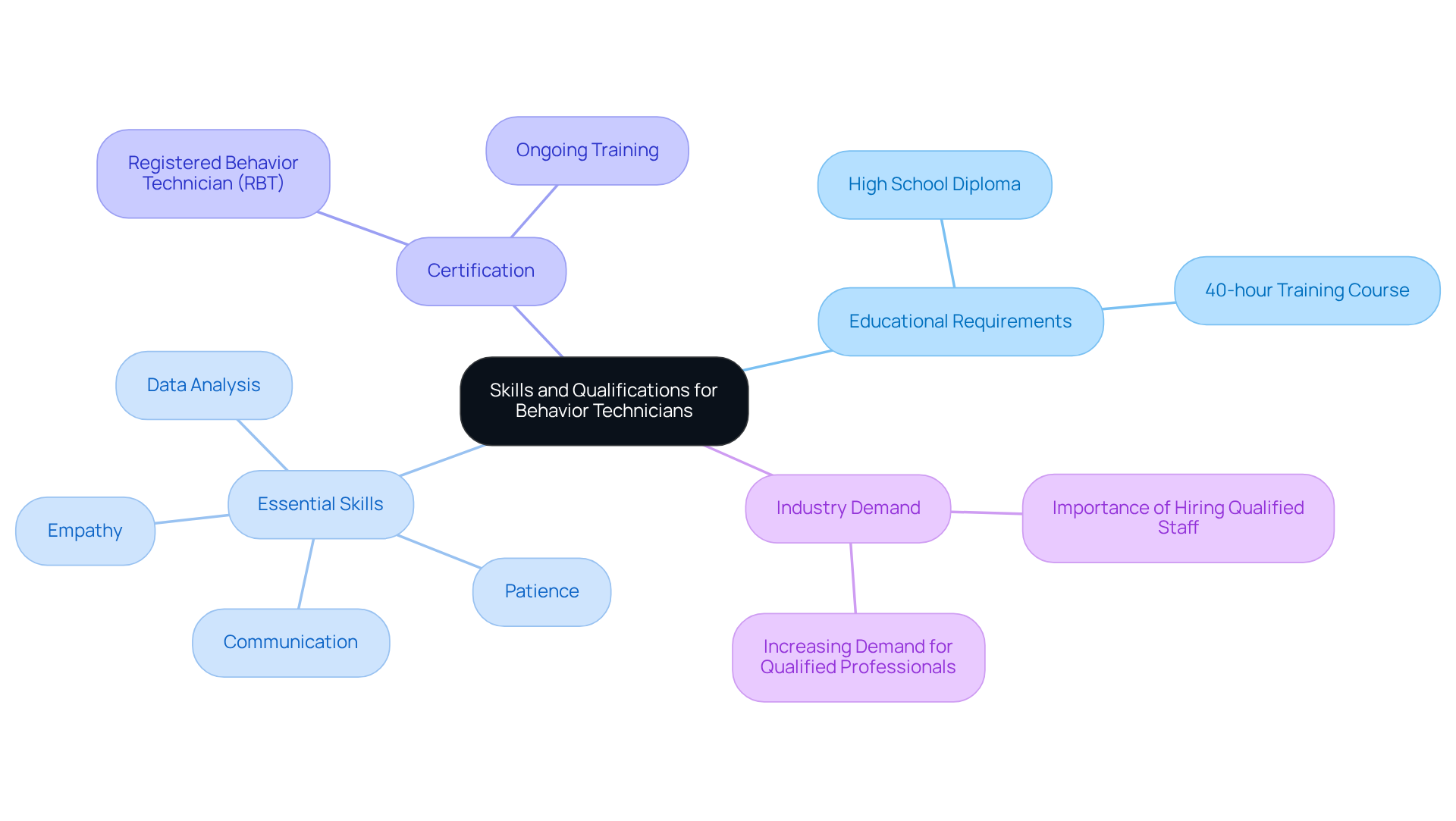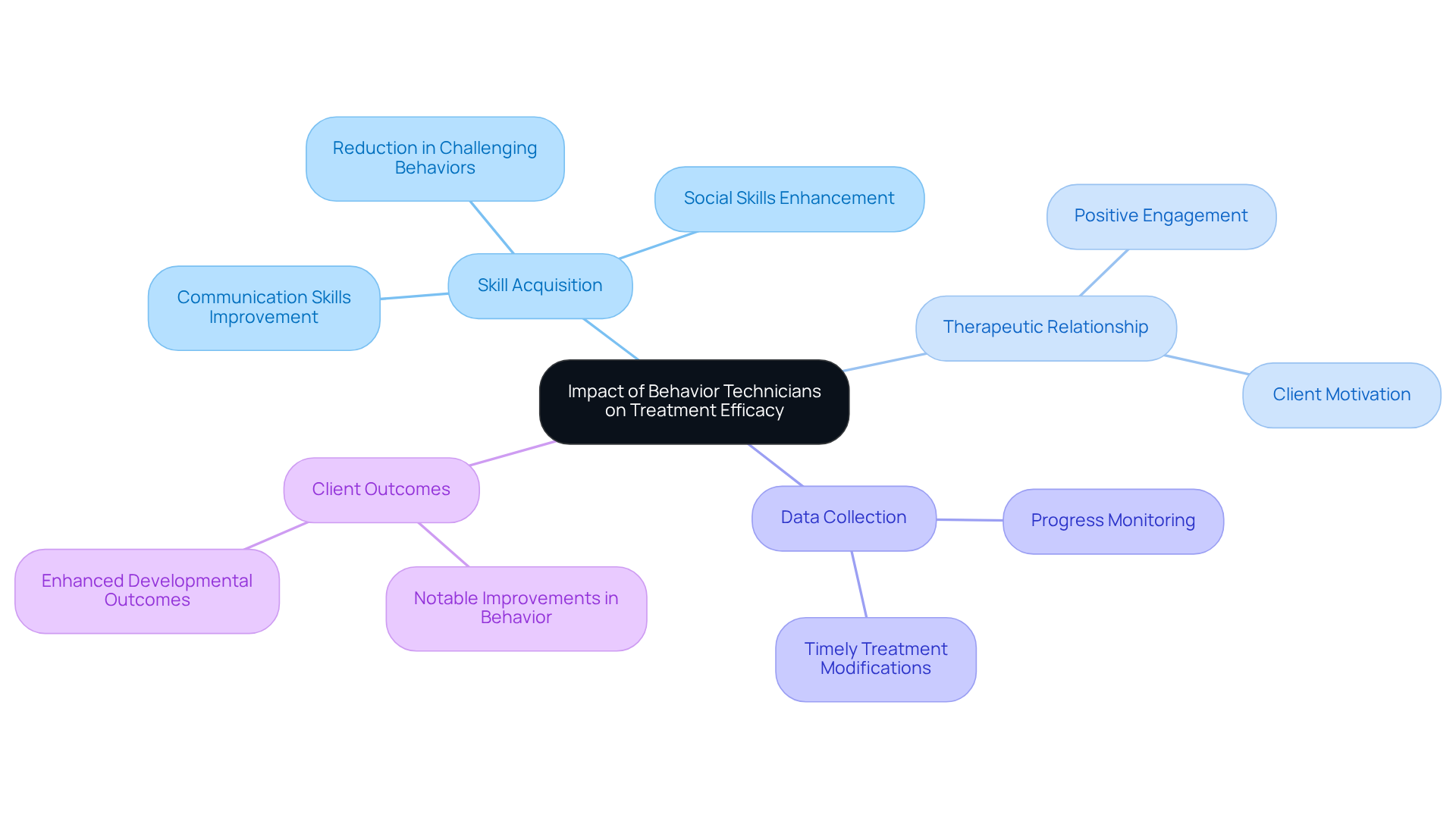September 17, 2025

Registered Behavior Technicians (RBTs) are indispensable in the realm of Applied Behavior Analysis (ABA) therapy. They provide direct care, implement treatment plans, and meticulously collect data on client progress, all under the vigilant supervision of Board Certified Behavior Analysts (BCBAs). Their role is not merely supportive; it is critical for achieving positive outcomes, particularly for individuals with autism spectrum disorder. By focusing on skill development and behavior management, RBTs create a nurturing therapeutic environment that fosters growth and progress.
Consider the challenges you face in hiring qualified professionals in this field. How can you ensure that your team is equipped to deliver the best care possible? Utilizing platforms like Hire ABA can streamline your recruitment process, connecting you with skilled RBTs who are ready to make a difference. Their expertise is vital in navigating the complexities of ABA therapy and enhancing client success.
In conclusion, the role of RBTs is paramount in fostering a supportive therapeutic environment. By prioritizing their recruitment, you can significantly improve the quality of care provided to clients, ultimately leading to better outcomes. Take action today to enhance your team with qualified professionals who are dedicated to making a positive impact.
In the intricate landscape of Applied Behavior Analysis (ABA), behavior technicians are the backbone of effective therapeutic interventions. These dedicated professionals, known as Registered Behavior Technicians (RBTs), play a crucial role in implementing personalized treatment plans that foster growth and development for individuals with autism spectrum disorder and other developmental disabilities.
As the demand for ABA services continues to rise, so do the challenges associated with the profession, including high turnover rates and burnout.
What truly defines the impact of behavior technicians on treatment efficacy? How can their roles be optimized to ensure the best outcomes for clients? Addressing these questions is vital for enhancing the effectiveness of ABA services and improving client satisfaction.
What do behavior technicians do? Registered Behavior Technicians (RBTs) are vital paraprofessionals in the field of Applied Behavior Analysis (ABA), responsible for implementing behavior-analytic services under the supervision of Board Certified Behavior Analysts (BCBAs).
What do behavior technicians do? They primarily provide direct care to clients, meticulously gather data on client progress, and assist in the implementation of tailored treatment plans aimed at addressing the unique needs of individuals with autism spectrum disorder (ASD) and other developmental disabilities.
RBTs concentrate on teaching new skills, mitigating challenging behaviors, and fostering a supportive learning environment, which illustrates what do behavior technicians do to encourage growth and development. The consistent and effective application of therapeutic interventions by RBTs is crucial for achieving favorable outcomes in ABA practice. Research indicates that children receiving at least 20 hours of ABA intervention weekly show significantly greater progress compared to those receiving fewer hours, underscoring the importance of RBTs in delivering high-quality care.
As of 2025, the United States boasts over 100,000 RBTs, illustrating a significant increase in the workforce to meet the escalating demand for ABA services. This expansion is imperative, as studies demonstrate that RBTs are instrumental in enhancing client outcomes, with effective treatment leading to improvements in communication, socialization, and overall quality of life for individuals with ASD. The commitment and expertise of RBTs illustrate what do behavior technicians do, which is essential to the success of ABA treatment, positioning them as key players in the therapeutic process.
Moreover, the projected job growth rate for RBTs is between 12% to 17% in the upcoming years, with an average salary of approximately $39,000; entry-level positions start around $35,000, while experienced RBTs can earn up to $50,000 annually.

In the field of Applied Behavior Analysis (ABA), therapy providers are essential frontline members of the treatment team, which includes Board Certified Behavior Analysts (BCBAs), parents, and other professionals, illustrating what do behavior technicians do.
With the demand for effective interventions for individuals with autism spectrum disorder (ASD) soaring, the role of support specialists has undergone significant evolution. Grounded in the principles of conduct analysis, their responsibilities emphasize data-driven decision-making and the development of personalized treatment plans.
By implementing these strategies, specialists foster the growth of critical skills in communication, social interaction, and self-management for their clients, ultimately enhancing their overall quality of life. Notably, practitioners play a substantial role in ABA treatment teams, which highlights what do behavior technicians do in the therapeutic process.
Their collaboration with BCBAs and other team members illustrates what do behavior technicians do, ensuring a comprehensive approach to therapy that creates an environment where clients can truly thrive. The impact of support specialists on treatment outcomes is profound, as they often demonstrate what do behavior technicians do by applying strategies that lead to observable advancements in clients' behaviors and abilities.
However, it is crucial to acknowledge the challenges faced by therapy professionals, including reported burnout, with 25% of ABA therapists citing stress as a reason for leaving their positions. This statistic highlights the urgent need for ongoing support and resources for these indispensable professionals.

To become a behavioral specialist, individuals typically need to possess a high school diploma or equivalent, along with the completion of a 40-hour training course approved by the Behavior Analyst Certification Board (BACB). The demand for qualified professionals in this field is increasing, making these qualifications essential. Crucial skills for support professionals encompass strong communication abilities, empathy, patience, and the capacity to gather and examine data precisely. Are you currently facing challenges in hiring qualified staff? Understanding these essential skills can help you identify the right candidates.
Furthermore, specialists must be flexible and capable of collaborating with other professionals in the field. Certification as a Registered Behavior Technician (RBT) is often required, which involves passing an examination and maintaining ongoing supervision and training. Current statistics indicate that the certification rate for RBTs has been steadily increasing, reflecting the growing demand for qualified professionals in the field. For instance, the case study titled "Personalized Pathways: Customizing ABA Support for Every Child" demonstrates that well-trained practitioners significantly enhance the effectiveness of ABA support, leading to better outcomes for clients.
These qualifications guarantee that care providers are well-prepared to deliver high-quality assistance and support to their clients. By focusing on these essential attributes and certifications, you can ensure that your team is equipped to meet the challenges of the field effectively. Consider utilizing platforms like Hire ABA to streamline your recruitment process and secure the best talent in behavioral support.

Behavior specialists are essential in enhancing the effectiveness of Applied Behavior Analysis (ABA) practices, ensuring that interventions are executed with precision and consistency. Research underscores that clients receiving treatment from highly skilled professionals experience notable improvements in behavior and developmental outcomes. For example, studies reveal that children with Autism Spectrum Disorder (ASD) who engage with Registered Behavior Technicians (RBTs) demonstrate significant advancements in communication skills, improved social interactions, and a reduction in challenging behaviors.
The immediate support provided by these specialists not only aids in skill acquisition but also cultivates a positive therapeutic relationship, which is vital for client engagement and motivation. Their role in data collection and progress monitoring is crucial, facilitating timely modifications to treatment plans and ensuring that interventions are effective and responsive to the evolving needs of clients. This comprehensive methodology highlights what behavior technicians do in delivering high-quality ABA therapy and achieving meaningful outcomes for individuals on the autism spectrum.

Registered Behavior Technicians (RBTs) are indispensable in the realm of Applied Behavior Analysis (ABA) therapy, serving as vital support professionals who implement customized interventions under the supervision of Board Certified Behavior Analysts (BCBAs). Their unwavering commitment to skill development, behavior management, and creating a supportive environment highlights their crucial role in the therapeutic process, ultimately leading to enhanced outcomes for individuals with autism spectrum disorder (ASD) and other developmental disabilities.
The multifaceted responsibilities of RBTs are explored, showcasing their:
The growing demand for qualified professionals in this sector is underscored by projected job growth and an increasing number of certified RBTs, reflecting the significance of their expertise in delivering effective ABA services. Moreover, the essential skills and qualifications required for success are emphasized, including:
The influence of behavior technicians on treatment effectiveness is profound. Their consistent implementation of therapeutic strategies not only boosts client engagement but also results in measurable improvements in communication, socialization, and overall quality of life. As the field expands, it is crucial to acknowledge the vital contributions of RBTs and to equip them with the necessary support and resources to excel. A commitment to investing in the training and well-being of these professionals will ensure that individuals with developmental disabilities receive the high-quality care they deserve, ultimately fostering a more inclusive and supportive environment for all.
What are the primary responsibilities of behavior technicians?
Behavior technicians, specifically Registered Behavior Technicians (RBTs), are responsible for implementing behavior-analytic services under the supervision of Board Certified Behavior Analysts (BCBAs). They provide direct care to clients, gather data on client progress, and assist in implementing tailored treatment plans for individuals with autism spectrum disorder (ASD) and other developmental disabilities.
How do behavior technicians support client development?
RBTs support client development by teaching new skills, mitigating challenging behaviors, and fostering a supportive learning environment. Their consistent application of therapeutic interventions is crucial for achieving favorable outcomes in Applied Behavior Analysis (ABA) practice.
What is the significance of the number of hours of ABA intervention provided?
Research indicates that children receiving at least 20 hours of ABA intervention weekly show significantly greater progress compared to those receiving fewer hours. This highlights the importance of RBTs in delivering high-quality care.
What is the current workforce size of RBTs in the United States?
As of 2025, there are over 100,000 Registered Behavior Technicians (RBTs) in the United States, reflecting a significant increase in the workforce to meet the growing demand for ABA services.
What is the projected job growth rate for behavior technicians?
The projected job growth rate for RBTs is between 12% to 17% in the upcoming years.
What is the average salary for behavior technicians?
The average salary for Registered Behavior Technicians is approximately $39,000, with entry-level positions starting around $35,000 and experienced RBTs earning up to $50,000 annually.
Our expert recruitment strategies and AI-driven sourcing ensure that you receive top-notch candidates quickly, without compromising on quality. Whether you’re looking for BCBAs, Clinical Directors, or RBTs, we’ve got you covered.